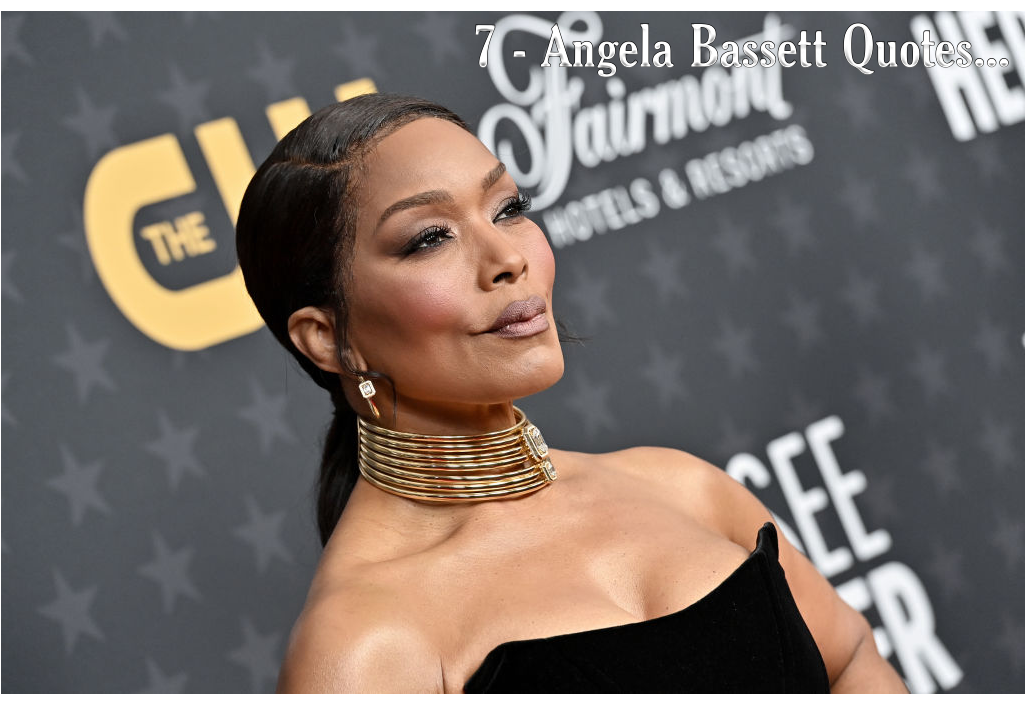(ThyBlackMan.com) Few actresses in American history embody the perfect blend of talent, discipline, grace, and cultural pride like Angela Bassett. From portraying Tina Turner in What’s Love Got to Do With It to earning her rightful acclaim in Black Panther: Wakanda Forever, Bassett’s career stands as a blueprint for excellence. Beyond her performances, however, Bassett’s words reveal a deep sense of faith, purpose, and wisdom rooted in the African American experience. Each quote she has shared over the years captures the spirit of resilience, creativity, and self-worth that defines her life and the communities she represents.
In a world that often prioritizes speed over substance, Bassett’s voice feels timeless. Her quotes do more than inspire—they remind us of our shared humanity, the importance of nurturing one’s gifts, and the necessity of surrounding ourselves with good energy. Let’s examine seven Angela Bassett quotes and how each continues to carry profound meaning in today’s ever-changing cultural landscape.

1. “God made a way out of no way.”
Angela Bassett’s words here resonate with generations of perseverance and deep-rooted spirituality. This phrase, born from the Black church tradition, represents faith birthed from hardship—a belief that divine strength forges paths where none seem to exist. For Bassett, who rose from humble beginnings in St. Petersburg, Florida, to the bright lights of Hollywood, these words aren’t just poetic—they are her life’s testimony. Her career embodies what it means to trust something greater than oneself while putting in the work to make the dream real. Every character she’s portrayed—from Tina Turner’s fire to Queen Ramonda’s wisdom—reflects that same energy of divine deliverance meeting human resilience.
But beyond Bassett’s personal journey, this phrase echoes the experiences of millions who’ve faced walls and still found doors. It’s a cultural declaration that speaks to how Black people have survived, innovated, and excelled through faith, even when circumstances said otherwise. From Reconstruction to the Civil Rights Movement to today’s struggles for equality, “God made a way out of no way” has been whispered, sung, and prayed as both comfort and motivation. It’s not simply about religion—it’s about endurance, spiritual ingenuity, and the refusal to be broken.
In the modern age, when so many people feel cornered by economic uncertainty, political division, or mental exhaustion, Bassett’s words cut through the noise. She reminds us that hope still belongs to the brave. Her quote challenges individuals to look beyond logic and focus on belief—that unseen pathways often open when faith and effort walk together. It’s a call to remember that success is rarely straightforward; it winds through valleys of struggle before rising to triumph.
Ultimately, Bassett’s declaration captures an eternal truth: that divine timing, mixed with unrelenting perseverance, always leads to breakthrough. Her statement is both a prayer and a promise—that when you keep walking, even through darkness, light eventually finds you.
2. “I want my children to experience as much creativity as possible. That’s what sets your mind on fire.”
Angela Bassett’s love for creativity is more than maternal advice—it’s a cultural mission. As an actress and mother, she recognizes creativity as the heartbeat of growth, expression, and survival. Creativity, for her, is not just about art; it’s about discovery, critical thinking, and liberation. When she says she wants her children to experience creativity, she’s emphasizing the power of imagination to expand possibilities and ignite purpose. It’s through creative exploration that we learn to transform the world around us rather than simply adapt to it.
Her message holds special weight given the African American tradition of using art to express freedom and identity. For generations, creativity has been both a weapon and a refuge—through music, poetry, dance, and storytelling. Bassett stands as a modern extension of that lineage, understanding that to nurture imagination in children is to ensure the continuation of cultural and emotional resilience. Whether through her roles or her parenting, she advocates for a mindset that values originality over conformity.
In today’s society, where screens dominate attention spans and automation threatens individuality, her words are both a warning and a remedy. Bassett’s vision of creativity encourages exploration over stagnation. She calls on families and educators to cultivate curiosity, reminding us that when young minds are allowed to imagine without fear, innovation follows. Creativity, in this sense, isn’t just an artistic act—it’s a spiritual awakening that fuels confidence and ambition.
What makes her quote even more relevant is its connection to joy. To set your “mind on fire” is to live passionately, to see the world not as it is but as it could be. Bassett’s belief in creativity as a life force ties to her larger philosophy: growth doesn’t happen in repetition, it happens in revelation. She teaches us that creativity is not something you outgrow—it’s something you feed daily to keep your soul alive.
3. “Drink a bunch of water and get facials regularly. I take care of my skin.”
At first glance, Angela Bassett’s quote sounds like simple beauty advice, but beneath it lies a deeper message about discipline, self-worth, and representation. For decades, Black women have had to fight against narrow and often damaging beauty standards. Bassett’s insistence on self-care isn’t just about outer appearance—it’s about inner respect. Taking care of one’s body becomes an act of self-preservation in a world that often demands sacrifice at the cost of well-being.
Her words embody a quiet rebellion: prioritizing rest and nourishment over the constant pressure to perform. Bassett reminds us that caring for yourself doesn’t mean you lack drive—it means you understand longevity. When she says she drinks water and gets facials, she’s really saying that health, balance, and self-love are non-negotiable for sustained excellence. The glow she radiates, both on and off the screen, comes from this philosophy of wholeness—mind, body, and spirit in alignment.
There’s also a generational lesson within her words. Too often, especially in professional spaces, Black women have been expected to give endlessly without tending to themselves. Bassett flips that narrative, emphasizing restoration over depletion. Her message urges everyone—men and women alike—to see self-care not as vanity but as vitality. The more you tend to yourself, the more capable you are of tending to others and fulfilling your purpose.
On a broader level, her quote also redefines aging. Angela Bassett, well into her 60s, continues to embody youthfulness, elegance, and power. Her skin-care routine becomes symbolic of legacy—proof that taking care of yourself is an investment that pays spiritual and physical dividends. She offers a reminder that wellness and beauty belong to everyone, and that confidence is the ultimate product of consistent self-respect.
4. “I’d tell my 20-year-old self, ‘Don’t be afraid to do it all. Whatever you’re interested in, just go for it. Don’t wait around for a better time.’”
Angela Bassett’s advice to her younger self speaks directly to the soul of ambition. It’s both a reflection and a challenge—to chase every interest, to silence fear, and to seize life without hesitation. For so many, the idea of “doing it all” feels overwhelming or even impossible. Bassett dismantles that hesitation by reminding us that passion is meant to be pursued, not rationed. She recognizes that fear is often the biggest barrier to fulfillment, and her words encourage us to reject the myth of waiting for the “right moment.”
Her message resonates especially with women and artists who’ve been told to play small or pick one lane. Bassett represents the opposite—she’s a scholar, actress, producer, and philanthropist who built a multifaceted legacy through boldness. Her advice is grounded in experience: she didn’t rise to success overnight. It came from taking risks, embracing challenges, and trusting that even the missteps were necessary for growth.
This quote also connects deeply with the modern era of opportunity and self-expression. We live in a world where people are redefining careers, blending disciplines, and building personal brands that reflect multiple passions. Bassett’s statement validates this fluidity—it’s okay to be a painter and a scientist, a teacher and an entrepreneur. What matters is not how neatly one’s interests fit into boxes, but how courageously they’re pursued.
For young dreamers, her words serve as both comfort and motivation. There will never be a perfect time, and waiting often turns into regret. The message Bassett leaves behind is one of liberation: the best time to create, to love, to learn, and to leap is always now. It’s this fearless approach that has defined her career and continues to inspire generations to take the same leap of faith into their own destinies.
5. “We all have a gift; we all have a passion – it’s just about finding it and going into it. Being an asset to your family and community.”
Angela Bassett’s words strike at the intersection of purpose and collective progress. She reminds us that our individual talents are not meant to serve only ourselves but to uplift those around us. This belief in shared advancement has long existed within Black culture and beyond—rooted in the understanding that personal growth contributes to communal strength. Her reference to being an “asset” carries moral weight: it’s not just about success; it’s about usefulness, compassion, and contribution.
Bassett’s quote dismantles the illusion of self-centered ambition that modern culture often glorifies. In an age where “me first” dominates social media, her reminder is both grounding and revolutionary. She emphasizes that one’s greatest power lies not in standing above others but in standing with them. When she speaks of family and community, she’s talking about a larger ecosystem of people who nurture, support, and inspire. Success, in her eyes, isn’t just measured by awards or wealth, but by how many lives you touch through your purpose.
Her own career reflects this philosophy. Whether she’s playing a queen, a mother, or a civil rights figure, Bassett’s portrayals carry dignity and empowerment. She gives her audience something larger than performance—she gives representation, pride, and possibility. Her work consistently transforms art into service, echoing the principle that one’s gift is most meaningful when shared.
Today, her message challenges us to evaluate our impact. How are we using our gifts? Are we contributing to something larger than ourselves? Bassett urges us to lean into passion not just for personal satisfaction but to strengthen our circles and communities. Her philosophy reminds us that legacy isn’t built by what we take, but by what we give back. In embracing that truth, we honor the generations that paved the way for us and ensure we are paving roads for those who will follow.
6. “I can give you the King’s English and then I can take it to the street, but do both or do one and don’t do one knowing only the street. That’s going to hold you back because what comes out is going to impress people, and it will impress them negatively.”
This quote from Angela Bassett shines a light on intelligence, identity, and adaptability. She’s speaking to something deeper than language—she’s addressing cultural fluency and the power of versatility. To be able to “give the King’s English” and also “take it to the street” means being able to navigate multiple worlds with confidence and awareness. Bassett is teaching that knowledge is power, and communication is one of its most essential tools.
Her perspective is one of empowerment, not conformity. She’s not asking anyone to change who they are but to broaden their reach. The ability to express oneself across different settings—whether in boardrooms, classrooms, or neighborhoods—creates opportunity. This dual mastery has long been a survival skill in America, where perception can shape one’s future. Bassett understands that articulation can open doors or close them, depending on how it’s wielded. Her advice is both practical and profound: learn every language of power, and use it to elevate yourself and others.
In modern times, her message feels especially relevant. Many young people wrestle with authenticity in professional or academic environments, feeling pressured to suppress their natural voices. Bassett offers balance instead of compromise—learn to adapt without erasing yourself. Speak in ways that connect, not just impress. Her statement also carries a subtle warning: lack of adaptability can limit potential. By mastering multiple modes of communication, we gain freedom to move fluidly through the world while remaining true to who we are.
Angela Bassett’s life and career embody this concept. She has always carried herself with grace and authority, commanding attention whether she’s speaking in the refined tones of a Yale graduate or the raw emotion of a character from the streets. Her words urge us to take pride in versatility—to expand our minds while staying rooted in authenticity. In her view, real intelligence is not just knowing what to say but how to say it, and to whom.
7. “It’s important to surround yourself with good people, interesting people, young people, young ideas. Go places, learn new stuff. Look at the world with wonder – don’t be tired about it.”
Angela Bassett’s final quote serves as both life philosophy and creative blueprint. She reminds us that growth is impossible in isolation. The people we surround ourselves with—our circle—shape our energy, mindset, and direction. For Bassett, greatness is not achieved alone; it’s built through connection and curiosity. She highlights the importance of remaining open to youth, new ideas, and evolving perspectives. Wisdom, she implies, isn’t about knowing everything—it’s about being willing to keep learning.
Bassett’s call to “look at the world with wonder” is particularly powerful in an age of cynicism. So many become jaded by routine, media noise, and constant comparison. Her words cut through that fatigue. She invites us to reclaim curiosity—to rediscover what it means to be alive and alert to the world’s beauty. That sense of wonder is what keeps the spirit young, no matter one’s age. It’s the same energy that fuels art, innovation, and joy.
Surrounding oneself with “good people” also carries moral and emotional significance. Bassett’s emphasis on quality relationships speaks to character building. Success becomes hollow when it’s not shared with those who inspire and challenge you. She values community over competition, reflection over isolation. Her advice encourages mentorship, collaboration, and humility—the recognition that everyone, even the most accomplished, has more to learn.
Angela Bassett lives this truth. Despite decades of fame, she continues to explore, evolve, and engage with the next generation of creatives and thinkers. Her mindset is not one of arrival but of continuous becoming. She teaches that staying curious keeps the soul vibrant. When she says “don’t be tired about it,” she’s urging us to resist emotional exhaustion and rediscover excitement for life’s possibilities. In her world, wonder is the ultimate act of resilience—a refusal to let the world dull your fire.
Angela Bassett’s quotes transcend celebrity—they form a living philosophy of resilience, curiosity, and excellence. Whether she speaks about faith, creativity, self-care, or community, her words remind us that greatness is a combination of heart and discipline. Her reflections carry echoes of African American history, cultural pride, and the universal desire to live fully and authentically.
In studying her wisdom, one sees not just an actress but a living historian—a woman who embodies the lessons of the past and translates them for modern times. Bassett’s voice encourages us to believe that we can nurture our gifts, stay curious, and rise despite every obstacle.
If history is defined by those who inspire transformation, then Angela Bassett’s words will endure for generations. She doesn’t just play legendary figures—she has become one.

















Leave a Reply